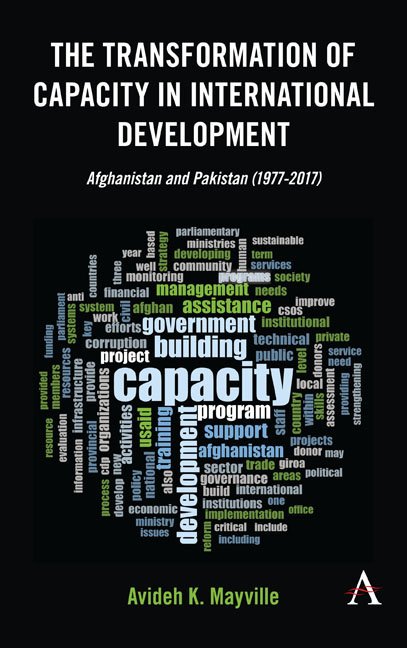Book contents
- Frontmatter
- Dedication
- Contents
- List of Figures
- Acknowledgments
- Chapter One Introduction
- Chapter Two Development Agendas and Donor Spaces: How Capacity Gained Salience
- Chapter Three Capacity in Development Policy and Practice: The Quest for Performance Excellence in the Governance of Disabling Environments
- Chapter Four Capacity and Fragility: The Sociological Framework for the Capacity Project and Developing “Fragile” States
- Chapter Five The Capacity Project in “AfPak”: Development Experiments, Subnational Spaces, and Transnational Networks
- Chapter Six The Battle for Power in Disabling Environments: Statecraft and Developing Capacity in Afghanistan and Pakistan
- Chapter Seven Developing Capacity to Manage Global Threats: Statemaking, the Militarization of Development, and Human Rights Approaches
- References
- Index
Chapter Two - Development Agendas and Donor Spaces: How Capacity Gained Salience
Published online by Cambridge University Press: 11 December 2019
- Frontmatter
- Dedication
- Contents
- List of Figures
- Acknowledgments
- Chapter One Introduction
- Chapter Two Development Agendas and Donor Spaces: How Capacity Gained Salience
- Chapter Three Capacity in Development Policy and Practice: The Quest for Performance Excellence in the Governance of Disabling Environments
- Chapter Four Capacity and Fragility: The Sociological Framework for the Capacity Project and Developing “Fragile” States
- Chapter Five The Capacity Project in “AfPak”: Development Experiments, Subnational Spaces, and Transnational Networks
- Chapter Six The Battle for Power in Disabling Environments: Statecraft and Developing Capacity in Afghanistan and Pakistan
- Chapter Seven Developing Capacity to Manage Global Threats: Statemaking, the Militarization of Development, and Human Rights Approaches
- References
- Index
Summary
What is the space within which donors operate? And what is the scale of the space in which donors operate? These questions matter in considering how to situate the emergence of capacity as a problem of development and its evolution into a project of development encompassing many different issue areas. This situating involves not only an examination of the ideological environment from which the issue of capacity was born but also scrutiny into the transformation of the actual development space— the institutions and actors— that both produce and establish agendas and frameworks for projects and also serve as vessels for the implementation of the policies of donors, which in USAID's case is the US government.
Later on in this book, I trace the evolution of transnational militant networks of resistance in conjunction with the integration of military and development activities during the Cold War. While Western donors cultivated transnational humanitarian and military networks to contain the Soviet influence coming from Afghanistan, Arab financiers also capitalized on the construction of a transnational infrastructure to support radical Islamic elements of the Afghan struggle against the Soviets. This period of Western funding of transnational networks to bifurcate the communist threat coming from the state established and legitimized the relationships of transnational militant resistance that evolved into the present-day campaign of Global Jihad stemming from the region.
The space in which donors produce knowledge, collaborate, facilitate relationships, and create agendas transcends national boundaries of operation and encompasses a multitude of actors and organizations operating on various scales. Broadly speaking, the scale of donor operation is extensive, but it is also limited. Through access to Pakistani state officials and Mujahideen leaders, the scale of donor operation during the Cold War extended into Afghanistan without donors ever having to establish relationships with the Soviet-occupied central government or even most of the Mujahideen leaders. Pakistan's ISI, through their relationships with militant leaders, granted the Pakistani state access to subnational spaces and transnational scales of operation across Afghanistan and Pakistan. This access was previously also granted to European humanitarian groups working directly with Mujahideen leaders during the Soviet occupation of Afghanistan. Traditional Organisation for Economic Co-operation and Development's (OECD) Development Assistance Committee (DAC) donor institutions and agencies, such as the USAID, have been unable to develop sustainable relationships with operators in subnational and transnational spaces that harbor networks of resistance and militancy.
- Type
- Chapter
- Information
- The Transformation of Capacity in International DevelopmentAfghanistan and Pakistan (1977–2017), pp. 15 - 44Publisher: Anthem PressPrint publication year: 2019

